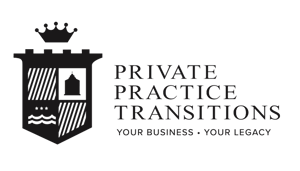When people think about selling their private practice, they may picture a simple procedure that involves putting it on the market and evaluating buyers’ bids. On the contrary, this process demands foresight, preparation, and strategic decision-making that influences your personal legacy, client relationships, and future security.
You must take a methodical approach and plan carefully to unlock the full value of the years you spent building your business. Review this guide for preparing your practice for selling so you can properly position it as an attractive opportunity for others.
Set Your Practice Up for Success
Believe it or not, part of the process begins well before you’re ready to sell. This requires you to take careful steps to set your practice up for future success and ensure it will be a business that attracts a future buyer’s eye.
For example, if you open an accounting practice, try to set goals for your business, such as the type of customers you want to serve. You may also want to participate in professional accounting organizations to start establishing contacts with people interested in acquiring your practice someday.
Meet With a Financial Planner
When you finally feel ready to sell your practice, seeking the help of a financial planner is best. They can help you analyze your current assets, debts, ongoing revenue streams, and anticipated expenses once you step away from your business.
You will gain an accurate snapshot of your financial health and learn about possible areas for improvement. Afterward, you should have a better sense of whether this is the right time to sell your business and retire or continue until you’re in a better financial position.
Organize Your Practice’s Finances
Another important step in preparing your practice for selling is organizing your finances. Meticulous financial records signal a well-managed business to potential buyers. Ensure your practice has accurate and up-to-date documentation of its income, expenses, accounts receivable, and payables.
Prospective buyers scrutinize tax returns, profit-and-loss statements, and cash flow analyses before considering an offer. Leaving your books disorganized can signal a risk or hidden liabilities to buyers, causing them to hesitate and lose confidence.
Trust between parties strengthens when transparent finances support your claims about revenue and profitability. By cleaning up your financial records before listing, you may experience higher offers and swifter closings.
Make Upgrades to Your Practice
First impressions can influence buyers’ perception during practice sales as much as during client meetings. If your practice still uses outdated technology and worn furniture or operates in poorly maintained facilities, it can hurt its overall value.
Invest in upgrades to office decor, equipment, and waiting room amenities to signal pride in your practice. For example, if you operate a physical therapy practice, consider investing in technological improvements, like electronic health records or streamlined scheduling software.
Simple, modern touches like fresh paint or enhanced lighting can also go a long way toward presenting a vibrant and welcoming atmosphere. A buyer’s interest increases when upgrades align with client needs and industry standards.
Have Your Practice Valued
Another important step in selling your business is finding a broker to perform a professional valuation and help you sell it. With their help, you can gain a professional assessment of tangible assets, intangibles such as goodwill and brand reputation, client churn risk, and the consistency of revenue streams.
Formal valuation helps you anticipate negotiation sticking points and offer crucial documentation that facilitates lender financing for buyers. Relying on a qualified valuation means the final number reflects true market dynamics, not assumptions or emotional attachment. You may even find that the valuation reveals previously overlooked strengths or untapped value, shaping a much stronger sale strategy for your practice.
Begin Handing Off Responsibilities
Smooth transitions require gradual delegation. Start training your key staff members to handle some of the core functions you oversee. Assigning critical responsibilities to trusted team members–from scheduling and billing to client communication–empowers your staff and reassures potential buyers about business continuity.
As your daily role in your practice decreases, your team will adapt to having greater autonomy and accountability. Buyers notice when a practice performs seamlessly without the owner being there to micromanage its operations. This can allow them to experience a more seamless handoff after closing the sale.
Determine the Type of Transition You Want
There’s often a phased transition after selling your practice, allowing you to stay involved part-time for several months or more to offer support and mentorship.
You should take the time to decide on the length of the transition that aligns with your goals. Open conversations with your advisors can foster transparency and mutual understanding, leading to fewer surprises and faster negotiations. By planning this part of the process ahead of time, you’ll feel more comfortable after you make the sale.
Start Documenting Your Operations
When a new owner takes over your business, it will be a great help for them to have documents outlining your practice’s operations. It is essential to write down protocols such as billing, phone triage, scheduling, regulatory compliance, and client onboarding.
Documenting these processes will support smooth daily operations after you are gone. Consider creating operations manuals, employee handbooks, and process flowcharts to create continuity. Organized documentation reassures buyers about stability and ease of management while minimizing post-sale interruptions that could drive client attrition.
Reconsider Your Fees
One last step for preparing your practice for sale is ensuring that your fee structure aligns with market expectations. Evaluate whether your current rates are competitive within your sector and geography.
Excessively high fees may deter potential buyers, while unusually low fees could raise concerns about undervaluation or future profitability. This step reinforces buyer confidence and demonstrates your professionalism and strategic foresight.
Preparing your practice for a sale enhances its value and attractiveness to buyers while supporting a seamless transition for clients and staff. Each step strengthens your outcome, protects your legacy, and promotes confidence throughout the sale process.
If you feel ready to begin preparing for a future sale, Private Practice Transitions can help. We can provide a professional valuation of your business, find the right buyer, and help you get the price you deserve for your practice.







